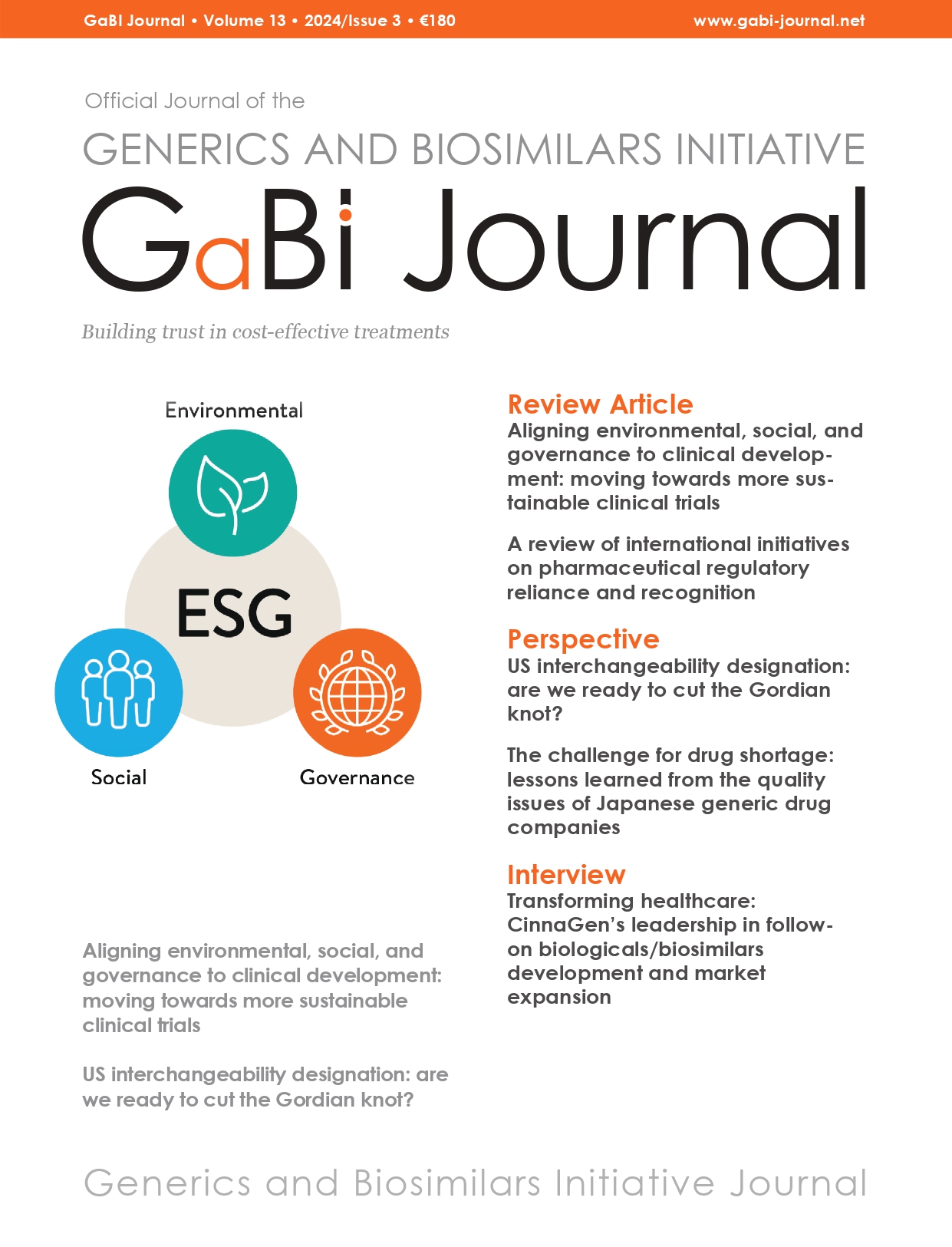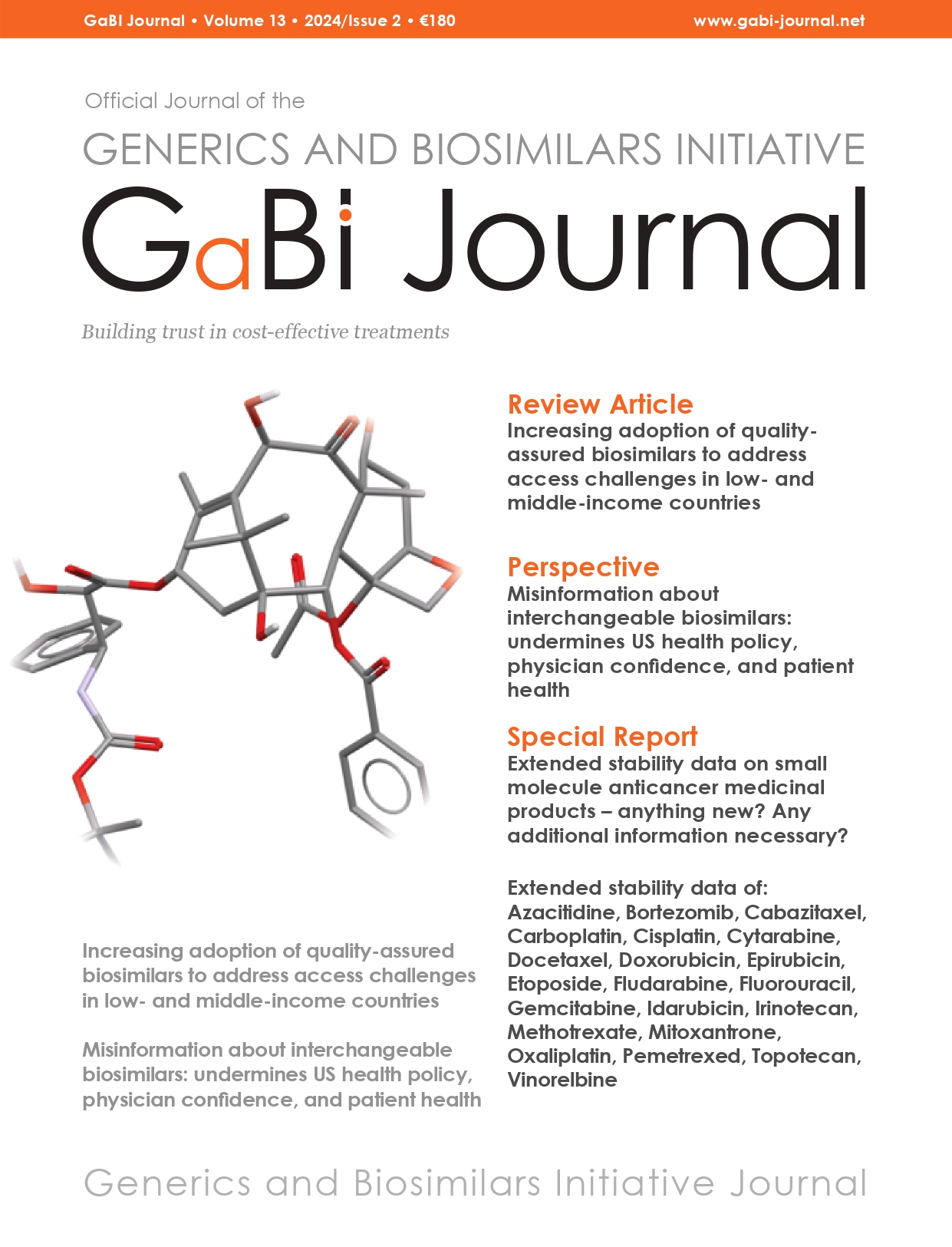Latest features in GaBI Journal, 2020, Issue 3
Published on 2020/09/22
Generics and Biosimilars Initiative Journal (GaBI Journal). 2020;9(3):95-6.
The Commentary in this issue of the GaBI Journal by Dr Elwyn Griffiths discusses the need for more global harmonization of regulatory approaches to biological medicines. Dr Griffiths refers to the conclusions of the GaBI organized ASEAN (Association of Southeast Asian Nation) conference on this topic. Similar calls have however come from participants in other educational conferences held globally by GaBI, as well as by many other groups working to improve access to safe and effective generic and biological products.
There has clearly been tremendous activity and rapid progress in the development, testing, regulatory approval, and post-marketing surveillance of biological and generic products. As learned in these conferences, the rate of change and its outcomes vary between different countries and regions, and the outcomes of these changes are not always positive. The situation reminds me of a 1776 quote from James Otis who wrote, referring to revolutionary American colonists, ‘when the pot boils, the scum will rise’ [1].
The impact of the COVID-19 pandemic, the use of economic boycotts to influence foreign policy, and shifting participation in global public health initiatives have all illustrated the need for more harmonization. One needs to look no further than the divergent, non-collaborative development and approval of COVID-19 vaccines as an example of what can happen when harmonization is deficient. The cost, economic and human of this deficiency will take years to become clear but is likely to be significant.
The first two Original Research manuscripts illustrate the importance of product delivery, an often-neglected aspect of biosimilar drug development, in outcomes. The first study by Hibino et al. found that about three-fourths of a small group of Japanese rheumatoid arthritis patients qualitatively preferred an etanercept biosimilar (YLB113) injection pen to a traditional syringe used to inject an originator etanercept. While limited by the open label design, the small sample population, and the possible effects of the extensive administration training provided, the results are still potentially important. In the second, much larger, but post-hoc study (2,007 assessments in 1,001 subjects) by Alten et al., injection-related pain was compared in healthy control and rheumatoid arthritis patients given subcutaneous injections of a biosimilar adalimumab (FKB327) versus a citrate containing originator adalimumab (Humira) product using different delivery methods (prefilled syringe, autoinjector, or vial/syringe) in a number of different, pooled studies. These authors reported that the FKB327 had less injection-site pain than the citrate containing adalimumab reference product and that the autoinjector was associated with less pain than the pre-filled syringe. Neither gender, age, body weight, needle gauge or injection site were significantly associated with pain. The clinical significance of the study results is limited by the fact that the reference adalimumab product has been reformulated to remove the citrate. Citrated adalimumab products are however still available.
Injection-related pain is only one possible factor affecting adherence. However, even for severe or even lethal diseases adherence is often suboptimal. Adherence with medications in paediatric transplant patients for example, ‘was found to be lower than 80% in two-thirds of the studies (64%) and varied from 22% to 97%’ [2]. Even patients with chronic myelogenous leukaemia (CML) are also often non-compliant with their use of imatinib, a highly effective drug for this lethal disease. A recent electronic chart review study of CML patients found for example that adherence, ‘was < 90% in 47% of the cases’ [3]. Anything that can improve adherence/compliance is likely to have an important effect on outcomes and therefore should be included in product comparison studies. These results also have implications for non-biological, generic drug products for which formulation content is not always adequately considered.
The third Original Research manuscript reports the result of an online, questionnaire study of the reported attitudes and beliefs of a selected group of subspecialist (Dermatology, Endocrinology, Gastro enterology, Haematology-Oncology, Immunology, Nephrology, Neurology, Oncology, Ophthalmology, Rheumatology) prescribers of biological medicines in France, Germany, Italy, Spain, Switzerland, or UK. The study was funded, performed, and published by the Alliance for Safe Biologic Medicines (ASBM). While the ASBM ‘is composed of diverse healthcare groups and individuals, it is largely funded by its pharmaceutical industry members. This group has performed and reported similar studies examining the attitudes of selected prescriber groups over the 13 years since the first biosimilars were marketed in Europe. While limited by the unknown veracity of the answers provided, the study provides useful data on prescribers’ attitudes with respect to control of decisions related to the selection, switching, substitution, and even pricing of biological medications. These data can be used to market products, but are also useful for educators, legislators, and public health officials interested in increasing the use of biosimilar products.
In the Regulatory, Roth et al. describe, in detail, the history of the approval by the EU of their biosimilar pegfilgrastim (Pelmeg®). The evolution of the entire analytical, functional, preclinical and clinical comparability programme used by their company (Mundipharma Biologics GmbH) to obtain this approval is outlined. The authors stress the importance of repeated discussions with EU regulators to continually modify the development programme to match the changing rules with respect to granulocyte colony-stimulating factor (G-CSF) products. Of special interest they describe the willingness of regulators to approve their proposals to substitute a surrogate efficacy endpoint (absolute neutrophil count) for traditional phase III safety and efficacy trials. The manuscript presents an encouraging example of how a manufacturer and EU regulators can work together to continually modify and improve product approval even when knowledge and regulations are constantly changing. It is hoped that even more efficient approval methods will be developed for all products, including those for rapidly emerging diseases such as for COVID-19.
The final article is a Meeting Report by Borg et al., describing the GaBI organized educational workshop on regulatory approval of biosimilars held in Colombia in April 2019. The meeting was funded by an unrestricted educational grant to GaBI from Amgen. The format of the meeting was the same as in other GaBI educational meetings. It included didactic lectures from experts from Canada, the EU and the US. There were panel discussions and Q & A sessions followed by evaluation of actual case studies by six small groups of participating stakeholders (regulators, clinicians, pharmacists, academics, and Colombian healthcare professionals). The meeting concluded with recommendations from the group for some steps needed to improve the uptake and access to medicines in Colombia.
Professor Philip D Walson, MD
Editor-in-Chief, GaBI Journal
References
1. Last Best Hope of Earth [homepage on the Internet]. [cited 2020 Sep 7]. Available from: https://lastbesthopeofearth.com/2016/02/15/the-scum-will-rise/
2. Hoegy D, Bleyzac N, Robinson P, Bertrand Y, Dussart C, Janoly-Dumenil A. Medication adherence in pediatric transplantation and assessment methods: a systematic review. Patient Prefer Adherence. 2019;13:705-19.
3. Dos Reis SR, Quixadá AT, Nunes ST, Cid DM, de Souza JH, da Costa CM, et al. Adherence to treatment with imatinib in chronic myeloid leukemia: a study of the first decade of responses obtained at a Brazilian hospital. Rev Bras Hematol Hemoter. 2013;35(3):174-9.
Disclosure of Conflict of Interest Statement is available upon request.
Copyright © 2020 Pro Pharma Communications International
Permission granted to reproduce for personal and non-commercial use only. All other reproduction, copy or reprinting of all or part of any ‘Content’ found on this website is strictly prohibited without the prior consent of the publisher. Contact the publisher to obtain permission before redistributing


